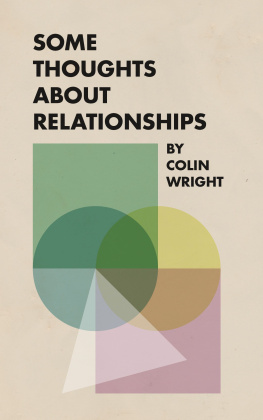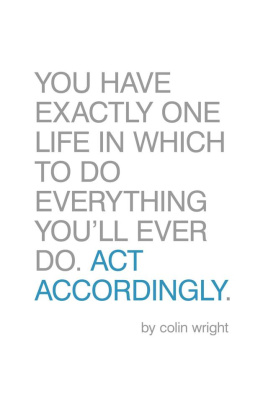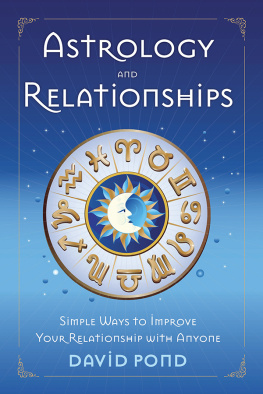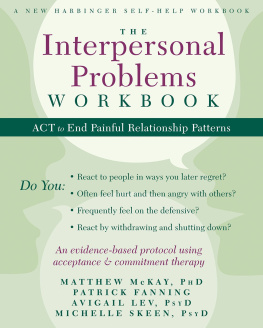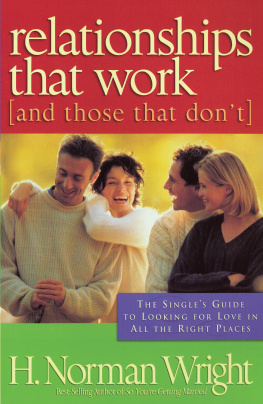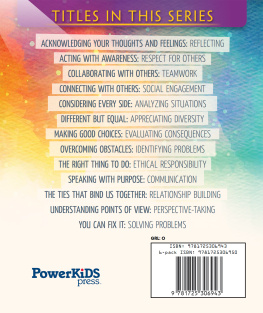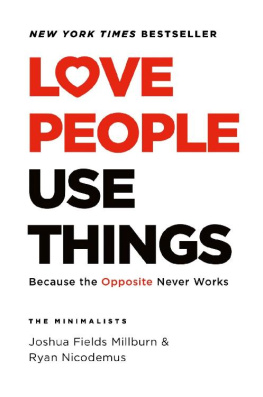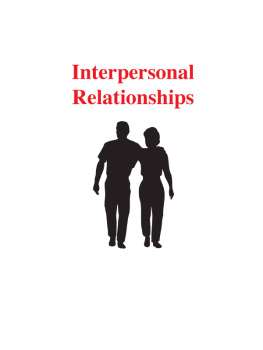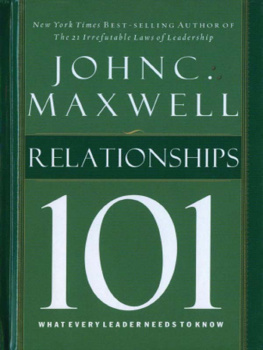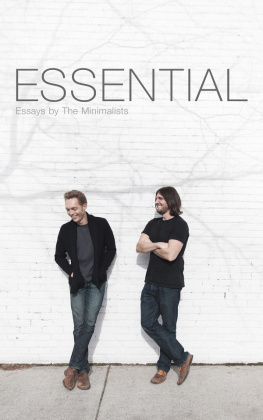Contents
Guide
Copyright 2021 Colin Wright
All rights reserved.
Thank you very much if you purchased this book (or supported your local library by borrowing it there): I appreciate you.
Even if you acquired it by some more nefarious means, though, I hope you find some value in it. Consider passing that value-windfall on by being especially kind today :)
Library of Congress Cataloging-In-Publication Data
Some Thoughts About Relationships / Colin Wright 2nd ed.
ISBN: 978-1-938793-88-2
eISBN: 978-1-938793-87-5
1. Relationships. 2. Self-Help. 3. Partnerships. 4. Personal Growth.
5. Communication.
Cover design by Colin Wright
For the wonderful people Ive been fortunate to date.
Thank you for the time we shared, the limits we tested, and for teaching me so very much.
The only real security is not in owning or possessing,
not in demanding or expecting, not in hoping, even.
Security in a relationship lies neither in looking back to
what it was, nor forward to what it might be,
but living in the present and accepting it as it is now.
Anne Morrow Lindbergh
I don't need anyone to rectify my existence.
The most profound relationship we will ever have is the one with ourselves.
Shirley MacLaine
Foreward
By Joshua Fields Millburn
If I could go back in time and give my eighteen-year-old self one nugget of advice, it would be this: You cant change the people around you, but you can change the people around you.
You see, for most of my life, nearly all of my relationshipsintimate or otherwisewere predicated on proximity and convenience. I made friends with coworkers in the same office building. I dated women because we grew up in the same town. I hung out with folks who were closest to me (geographically) but not closest to me (behaviorally).
While theres nothing wrong with building bonds with the people youre forced to spend time with each day (in fact, Id encourage it), the problem is that we all have the same twenty-four hours in a day; and so, if we allocate all of our time and attentionour two most precious resourcesto people who dont share our standards, then its hard to build stable, meaningful relationships.
I know this now, of course, looking in the rearview, because, after thirty-four years of trial and error, Ive finally surrounded myself with people who have values similar to my own.
I first met Colin Wright in an unconventional way: via Twitter, in 2009, the month after my marriage disintegrated. Although we were thousands of miles wayhim in New Zealand, me in Dayton, Ohiowe established a friendship based on common interests.
One of the first things I noticed about Colin is that hes a good person. At first glance, though, I was certain his nice-guy demeanor was only a well-crafted facade. I mean, could someone really be this honest and open and caring? Probably not. At least not from what Id experienced in my Midwestern propinquity bubble. However, as Ive gotten to know him these past six years, Ive learned that Colins outward appearance is a genuine reflection of what is going on inside: what he says and who he is are congruent.
Now, thats not to say that he and I have the same personalities. We dont. In fact, even though we have similar values, we often arrive at those values via different beliefs, which means well debate specifics all day long, but, because our values are sound, we rarely disagree on the principles themselves.
For years, Ive asked Colin to write a book containing his thoughts on relationships. Some Thoughts About Relationships is that book. The following pages are filled with principleswhat Colin calls Policiesthat can be applied to business relationships, friendships, and lovers. While many of the insights in this book might seem as if they were written with a bent toward intimate connections, I believe that every Policy herein is valuable no matter the context of the relationship.
Its worth mentioning that most of the topics breached in each chapter are somewhat unconventionaland thats a good thing: too often, convention forces us to go with the flow, but then, in time, the flow eventually drags us to the falls, which we dont realize until its too late. Colins thoughts on relationships will help you paddle upstream, avoid the falls, and curate new, worthwhile relationships grounded in trust and caring and, most import, shared values.
Introduction
I dont drink coffee after 3pm.
This is one of my many policies, a term I use for the guidelines Ive discovered work well for me, but which arent laws chiseled into stone tablets, handed down by elders, backed by oral tradition, and broken only at my mortal souls peril.
I sleep much better when I keep my caffeine consumption time-restricted, but Ill still sometimes break my Coffee Policy, consuming a cup at 3:30pm when Im really on a roll and want to keep my morning momentum going just a little longer. Or maybe Ill have a post-dinner espresso while visiting a country, or family, where after-food digestives are part and parcel for a pleasant and sociable evening. While on long distance road trips which require extended, late-night drives, Ill banish my coffee restriction completely. For a time, at least.
This book is organized around policies. Much like my Coffee Policy, they are guidelines that I know will be periodically bent and broken. These ideas have become best-practices for me and what I want out of relationships, but are in no way one-size-fits-all. The policies that follow are a good starting point for developing your own guidelines, but neednt be bought into wholesale to be effective.
My earnest hope is that these concepts and perspectives will help catalyze more intentionality on the topic of relationships, spark more productive conversations and self-reflection, and maybe even provide an introduction to some unfamiliar facets of partnerships. That being said, identifying what you actually want in a relationship, figuring out how to make that happen in real life, and doing so in a healthy, maintainable fashion, is up to you.
A strange thing happens when your relationships become more balanced and healthy: the storylines portrayed on television, in movies, and written about in novels seldom make much sense. Not all stories, just those that revolve around distrust and deceit.
Broken or misaligned relationships are a common trope, featured in everything from romance novels to science fiction, in westerns and Shakespearean plays. Someone hurts someone else, and revenge is sought. Or someone cheats, and another character questions everything. Or someone fails as a spouse, or a would-be-spouse, by failing to know their partner on a deep level, without words needing to be spoken. Heartbreak, confusion, or murder ensues.
I understand why these stories are told the way they are told. Im not blind to the appeal of drama and intrigue. But I do feel Im being forced to suspend disbelief pretty much all the time. Theres no way were that bad at communicating with each other, that bad at making our needs known, that bad at managing our relationships and keeping them balanced, that bad at setting expectations and living up to them. Are we?
We are. Sometimes, anyway. I dont know if its life imitating art or the other way around. Likely its a bit of both. The dramatized conflict is informed by what actually happens between partners, and people living in the real world are informed by what they see on screens, read in fiction, and watch on stages. This is how relationships are, were told. Theyre difficult and emotion-driven, and you may have to fight and strain to make them work.

